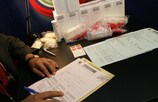Doping control officers meet
Thursday, May 28, 2015
Article summary
UEFA's doping control officers (DCOs) make a crucial contribution to the fight against drug-taking in football, and their seminar in Nyon revealed important plans for the future.
Article top media content

Article body
UEFA's new steroid profiling programme, anti-doping activities for UEFA EURO 2016 and a unique new testing development programme were focal points of the latest seminar for UEFA's doping control officers (DCOs) at the House of European Football in Nyon.
The officials responsible for conducting UEFA doping tests, thereby making an essential contribution to the fight against drug-taking in European football, were given comprehensive details about the ground-breaking steroid profiling programme which will begin at the start of the 2015/16 season in all UEFA competitions.
The head of the UEFA medical and anti-doping unit, Marc Vouillamoz, told the 55 DCOs present that the steroid profiling programme will act as an important deterrent to any player who might consider taking banned steroids, because it will help improve the detection of the effects of doping over time, as well as complement the direct anti-doping testing that is taking place.
UEFA's new programme will help create biological passport profiles for players. The Athlete Biological Passport (ABP) will monitor players over time, and indirectly reveal the effects of doping as a result, as well as providing intelligence for target testing. "We will be sharing data, information and intelligence, and harmonising doping control procedures with our anti-doping partners in the future," said Vouillamoz. "The fight against doping will be better in the future if we are working together, and with the steroid profiling programme we are going in that direction."
The seminar heard that no positive cases have been registered so far this season in doping tests across all UEFA competitions. "The steroid profiles will give us more information and intelligence," Vouillamoz explained to the DCOs. "Tests will increase next season, to populate the steroid profiles of the players. We will count on you even more next season."
Turning to the UEFA EURO 2016 anti-doping programme, the DCOs were informed that, given the increased tournament field of 24 teams at the final round in France next summer, UEFA was planning to commence its out-of-competition testing from 1 January next year, compared with May 2012 for the last EURO finals in Poland and Ukraine. A higher number of DCOs would therefore be required for in and out-of-competition testing.
UEFA intends to carry out tests with the 24 teams from January to May/June next year, with a combination of blood, urine and serum samples being collected in and out of competition. Tests will also be conducted at each of the 51 matches in France, involving two players from each team at every game, who will also undergo blood, urine and serum tests. The choice of a World Anti-Doping Agency (WADA)-accredited laboratory to analyse the samples is set to be made by the end of the year.
The seminar also brought an explanation of UEFA's new testing development programme for DCOs, which will ensure that the latter are officially accredited, thus giving them extra credibility in their work. UEFA will also be improving its instructions and rules, and offering better support for DCOs during missions. The DCOs will be visited on missions, to help draw up a picture of the way the doping controls are carried out against the way in which UEFA asks for the controls to be conducted. The advantages of this new departure in the anti-doping world will be, among others, improvements in the quality of anti-doping tests, and better understanding and exchanges of information between UEFA and the DCOs.
UEFA Medical Committee chairman Michel D’Hooghe thanked the DCOs for their commitment, which will be in full evidence during an intense 2015/16 campaign, culminating in next summer's EURO in France. "I always consider that there are three main problems in football today – match-fixing, racism and doping," he said. "Although people might say there are so few positive cases of doping in football, if we did less doping controls [tomorrow], I think we would have a higher number of cases."








